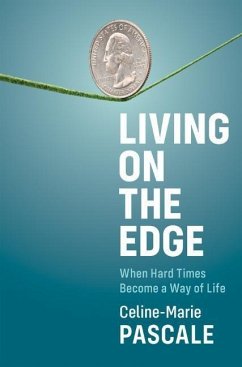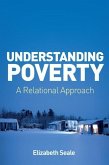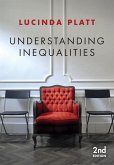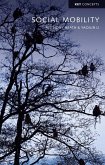For the majority of Americans, hard times have long been a way of life. Some work multiple low-wage jobs, others face the squeeze of stagnant wages and rising costs of living. Sociologist Celine-Marie Pascale talked with people across Appalachia, at the Standing Rock and Wind River reservations, and in the bustling city of Oakland, California. Their voices offer a wide range of experiences that complicate dominant national narratives about economic struggles.
Yet Living on the Edge is about more than individual experiences. It's about a nation in a deep economic and moral crisis. It's about the long-standing collusion between government and corporations that prioritizes profits over people, over the environment, and over the nation's well-being. It's about how racism, sexism, violence, and the pandemic shape daily experience in struggling communities. And, ultimately, it's a book about hope that lays out a vision for the future as honest as it is ambitious.
Most people in the book are not progressives; none are radicals. They're hard-working people who know from experience that the current system is unsustainable. Across the country people described the need for a living wage, accessible health care, immigration reform, and free education. Their voices are worth listening to.
Hinweis: Dieser Artikel kann nur an eine deutsche Lieferadresse ausgeliefert werden.
Yet Living on the Edge is about more than individual experiences. It's about a nation in a deep economic and moral crisis. It's about the long-standing collusion between government and corporations that prioritizes profits over people, over the environment, and over the nation's well-being. It's about how racism, sexism, violence, and the pandemic shape daily experience in struggling communities. And, ultimately, it's a book about hope that lays out a vision for the future as honest as it is ambitious.
Most people in the book are not progressives; none are radicals. They're hard-working people who know from experience that the current system is unsustainable. Across the country people described the need for a living wage, accessible health care, immigration reform, and free education. Their voices are worth listening to.
Hinweis: Dieser Artikel kann nur an eine deutsche Lieferadresse ausgeliefert werden.
Non-Fiction Runner Up, Weatherford Award of Berea College and the Appalachian Studies Association
?To read Pascale?s book, to tour the lives of those she calls ?the struggling class? ? is to come away convinced we live in a rigged game where corporations buy politicians who subsidize those corporations with public money.?
Miami Herald
"Living on the Edge is a vivid expose of the horrific poverty faced by the struggling classes in the US, but it's more than that. Pascale elaborates the patterns of domination ? banks, corporations, and government ? that lead people to adopt desperate but self-defeating strategies of survival. Nothing quite like it since Michael Harrington's The Other America."
Michael Burawoy, University of California, Berkeley, and Past President of the American Sociological Association and of the International Sociological Association
"Required reading for anyone who wants to understand, in a way that is both supremely accessible and thoroughly researched, the systemic inequalities designed to hold down 'The Struggling Class.'"
Chase Iron Eyes, Lakota People's Law Project Co-Director and Lead Counsel
?A rare book that combines a humane accounting of lives lived in hardship with a robust and data-driven critique of the policies that caused their dysfunction.?
Elizabeth Catte, author of What You Are Getting Wrong About Appalachia
?This is an impressive book, wide and deep, with diverse people around the country struggling to live. A yarn; no, yarns ? economic and much more ? always real, face-to-face with the author: what their lives are, sometimes doing themselves no favors, but more often the effects of laws and attitudes both far away and near, government and corporations, and the hate of people. Why it's hard to end poverty. Living on the Edge reaches in every direction. Personal, powerful: once you pick it up, you won't put it down.?
Peter Edelman, Carmack Waterhouse Professor of Law and Public Policy and Faculty Director of the Center on Poverty and Inequality, Georgetown Law Center
?In a trenchant analysis, Celine-Marie Pascale shows how low-income workers? everyday lives expose a deeply unfair system. A brilliant account of ?hard-knocks egalitarianism.??
David B. Grusky, Professor of Sociology and Director of the Center on Poverty and Inequality, Stanford University
?A clarion call for much needed reform if our democracy is to survive the growing disenchantment of a large and growing proportion of the American citizenry, Living on the Edge: When Hard Times Become a Way of Life should be required reading by all governmental policy makers and is especially commended to the attention of political activists, economists, and non-specialist general readers with an interest in the subject of income inequality.?
MidWest Book Review
?This often poignant and moving book presents a vision of America and Americans that is often missing from dominant narratives. One walks away from this book with a better sense of the diversity of average, struggling Americans, as well as what all those people have in common ? the struggle. As the author says, ?this is more than a collection of individual troubles; it is the story of a nation in a deep economic and moral crisis.??
Allison L. Hurst, Associate Professor of Sociology, Oregon State University
"This thorough and penetrating book offers a convincing argument about why so many families are struggling to make ends meet and who they are as fully rounded people. The writing and narration are superb. I would call this a page turner, which is not my usual experience in reading books on this topic."
Susan Greenbaum, Emerita Professor of Anthropology, University of South Florida
"By turns sad, enraging and hopeful."
The Indypendent
?Dr. Pascale writes with clarity, purpose, and a studied, personal understanding of the human condition. ?The Struggling Class? will be a term new to many, but it is, indeed, the way of life for too many others. The book should be required reading for anyone who wants to understand, in a way that is both supremely accessible and thoroughly researched, how economic, racial, class, caste, geographical, environmental, and other factors converge to create systemic inequalities designed to hold down a diverse stratum of people ? from the Native residents on the Standing Rock Nation, where I grew up, to those doing their level best to make life work every day in places like Appalachia, Wind River, and Oakland. It skillfully illustrates key connective tissues that demonstrate how, despite outward differences, we share in the same struggle. In order to reinvent a democracy that works for everyone, we need radical, systemic change that begins to address the financialized, extractive colonial mentality and other, deeply embedded cultural wrongs. Only in this way can we begin to envision a fairer, healthier future for the next generations.?
Chase Iron Eyes, Lakota People's Law Project Co-Director and Lead Counsel
?Some of the stories included in the book are shocking, terrifying, heart-breaking, and at the same time are the ordinary, everyday reality for people from [the] struggling class.?
Language, Discourse & Society
?[Pascale] takes Naomi Klein?s work on disaster capitalism a step further, showing how the various mechanisms of the US economic system ? federal, state, and local government, corporations as employers and retailers, even the healthcare system ? collude to create the disasters to be capitalized on. Her easy-to-read style and logical formatting of information further make her point.?
The Montreal Review "By turns sad, enraging and hopeful." The Indypendent
?To read Pascale?s book, to tour the lives of those she calls ?the struggling class? ? is to come away convinced we live in a rigged game where corporations buy politicians who subsidize those corporations with public money.?
Miami Herald
"Living on the Edge is a vivid expose of the horrific poverty faced by the struggling classes in the US, but it's more than that. Pascale elaborates the patterns of domination ? banks, corporations, and government ? that lead people to adopt desperate but self-defeating strategies of survival. Nothing quite like it since Michael Harrington's The Other America."
Michael Burawoy, University of California, Berkeley, and Past President of the American Sociological Association and of the International Sociological Association
"Required reading for anyone who wants to understand, in a way that is both supremely accessible and thoroughly researched, the systemic inequalities designed to hold down 'The Struggling Class.'"
Chase Iron Eyes, Lakota People's Law Project Co-Director and Lead Counsel
?A rare book that combines a humane accounting of lives lived in hardship with a robust and data-driven critique of the policies that caused their dysfunction.?
Elizabeth Catte, author of What You Are Getting Wrong About Appalachia
?This is an impressive book, wide and deep, with diverse people around the country struggling to live. A yarn; no, yarns ? economic and much more ? always real, face-to-face with the author: what their lives are, sometimes doing themselves no favors, but more often the effects of laws and attitudes both far away and near, government and corporations, and the hate of people. Why it's hard to end poverty. Living on the Edge reaches in every direction. Personal, powerful: once you pick it up, you won't put it down.?
Peter Edelman, Carmack Waterhouse Professor of Law and Public Policy and Faculty Director of the Center on Poverty and Inequality, Georgetown Law Center
?In a trenchant analysis, Celine-Marie Pascale shows how low-income workers? everyday lives expose a deeply unfair system. A brilliant account of ?hard-knocks egalitarianism.??
David B. Grusky, Professor of Sociology and Director of the Center on Poverty and Inequality, Stanford University
?A clarion call for much needed reform if our democracy is to survive the growing disenchantment of a large and growing proportion of the American citizenry, Living on the Edge: When Hard Times Become a Way of Life should be required reading by all governmental policy makers and is especially commended to the attention of political activists, economists, and non-specialist general readers with an interest in the subject of income inequality.?
MidWest Book Review
?This often poignant and moving book presents a vision of America and Americans that is often missing from dominant narratives. One walks away from this book with a better sense of the diversity of average, struggling Americans, as well as what all those people have in common ? the struggle. As the author says, ?this is more than a collection of individual troubles; it is the story of a nation in a deep economic and moral crisis.??
Allison L. Hurst, Associate Professor of Sociology, Oregon State University
"This thorough and penetrating book offers a convincing argument about why so many families are struggling to make ends meet and who they are as fully rounded people. The writing and narration are superb. I would call this a page turner, which is not my usual experience in reading books on this topic."
Susan Greenbaum, Emerita Professor of Anthropology, University of South Florida
"By turns sad, enraging and hopeful."
The Indypendent
?Dr. Pascale writes with clarity, purpose, and a studied, personal understanding of the human condition. ?The Struggling Class? will be a term new to many, but it is, indeed, the way of life for too many others. The book should be required reading for anyone who wants to understand, in a way that is both supremely accessible and thoroughly researched, how economic, racial, class, caste, geographical, environmental, and other factors converge to create systemic inequalities designed to hold down a diverse stratum of people ? from the Native residents on the Standing Rock Nation, where I grew up, to those doing their level best to make life work every day in places like Appalachia, Wind River, and Oakland. It skillfully illustrates key connective tissues that demonstrate how, despite outward differences, we share in the same struggle. In order to reinvent a democracy that works for everyone, we need radical, systemic change that begins to address the financialized, extractive colonial mentality and other, deeply embedded cultural wrongs. Only in this way can we begin to envision a fairer, healthier future for the next generations.?
Chase Iron Eyes, Lakota People's Law Project Co-Director and Lead Counsel
?Some of the stories included in the book are shocking, terrifying, heart-breaking, and at the same time are the ordinary, everyday reality for people from [the] struggling class.?
Language, Discourse & Society
?[Pascale] takes Naomi Klein?s work on disaster capitalism a step further, showing how the various mechanisms of the US economic system ? federal, state, and local government, corporations as employers and retailers, even the healthcare system ? collude to create the disasters to be capitalized on. Her easy-to-read style and logical formatting of information further make her point.?
The Montreal Review "By turns sad, enraging and hopeful." The Indypendent









